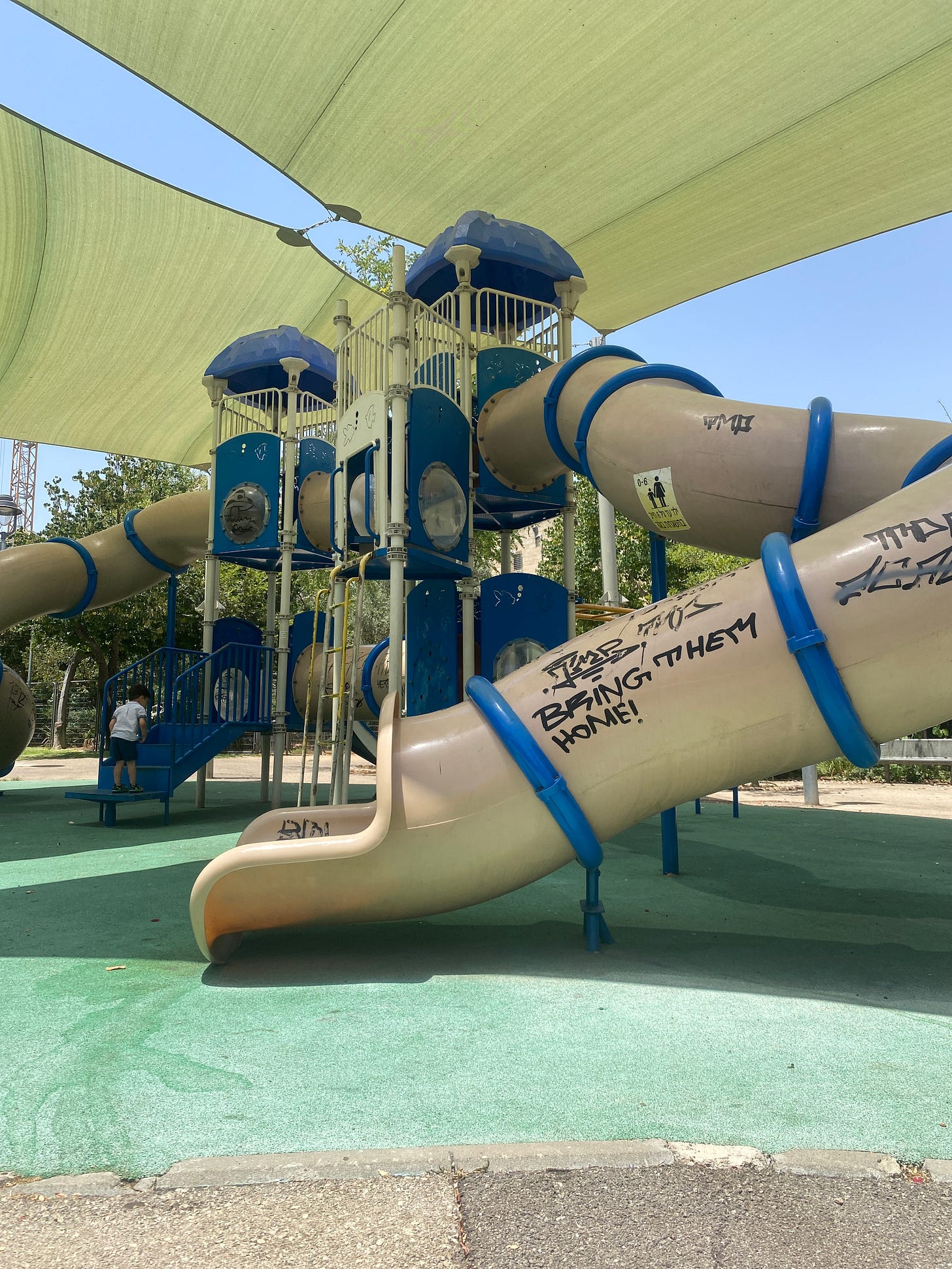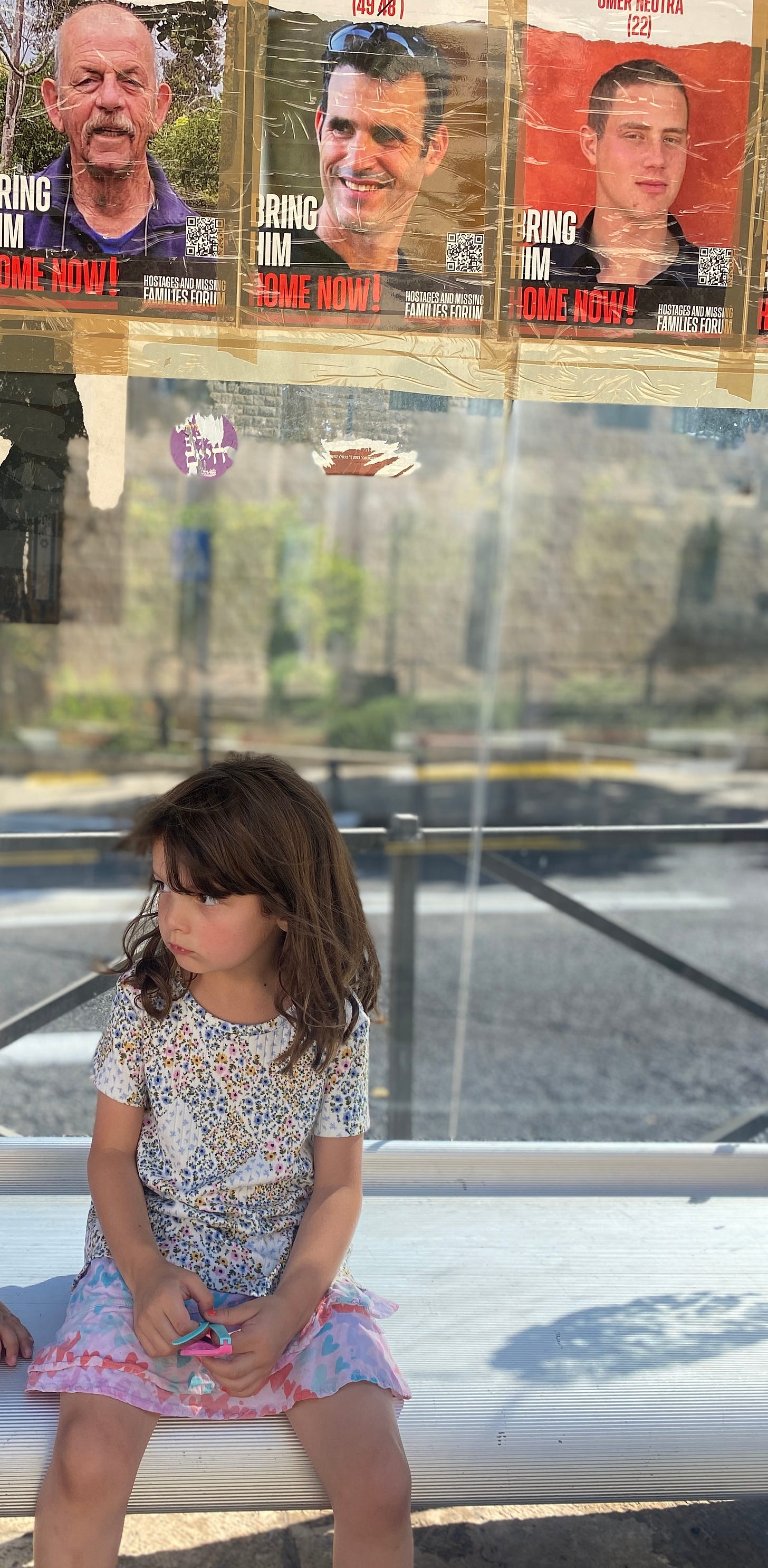I took my family to Israel for a month during a war.
I didn’t buy the tickets for our June trip until May. What if Iran got excited? What if the airport shut down and we got stuck? Would we dump a savings account on a month in a humid bomb shelter? What if my kids’ first experience of our homeland was running from sirens? In those dark moments, would I be prepared to field questions about why the people next door are so hell bent on killing them? What if we died?
When I moved to Seattle in 2010, I heard someone say she was heading to Israel for the first time in 20 years. This horrified me. As a young, single person, all I did was save enough money to travel from the East Coast to Europe and Israel, where I lived on espresso and bread and slept on people’s couches and floors. Twenty years??
Then 15 years sped by. Fifteen years of babies, wars, no vacation time, no budget, and, right when we were about to travel, a freak global pandemic. And then, FFS, October 7th. I started to wonder if we’d ever visit Israel again. I wondered if by the time we got our act together, it would still exist. My finger hovered over the “buy now” button on the United Airlines page for weeks. Maybe a better investment would be to replace the roof.
In those 15 years, while I grew ideologically closer to Israel, I also grew distant. A dynamic civilization flattened into a newsfeed, a series of cold philosophical and political arguments. I recalled what Tracy Brazg said in our conversation about anti-Zionism: “I see Israel today as a country that exists with real people who live there, and a societal infrastructure, a culture of its own, language, and institutions. I see it as just a real place where people need to be able to continue to live just like every country in the world.” Oh, yeah.
I barely committed to the trip until we actually landed, not fully believing we would make it. Despite several people telling me how different it would look in the 15 years that had passed, everything I remembered from the years I bopped in and out of Israel was exactly the same. The main difference was the posters of the hostages plastered onto every available surface. Even a Jerusalem playground was tagged in graffiti with the message “Bring them home.”
Even through this gossamer gray cloud of war, spirits were up. Shops and restaurants were busy, buses were packed. Israelis were friendlier than I remember, more willing to help, looking out for one another in a way that either seemed new, or perhaps just stood in contrast to Seattle, where even on a busy street I’m not sure anyone would hear me scream.
Ironically, friends with plans to visit Seattle asked me if I thought it was safe. To visit America, to be clear. Men are opting to wear caps over their kippot, women are tucking in their necklaces. In Eilat, presumably because of the Houthi threats, GPS signals are scrambled, so you need to rely on your own wits to get around. A friend who lives so far south that, when strolling through her kibbutz’s date palms, T-Mobile sent a message welcoming me to Jordan, shared stories she’d heard about Seattle with incredulity. A sticker that said queer and trans liberation is linked to Palestinian liberation? Are they crazy?
I won’t sugarcoat Israel. It’s a tough place with a bloody history, a government half the country hates, hot-blooded people crowded into a tiny strip of land that’s surrounded by well-armed haters.
Which is why it’s all the more miraculous that it’s such a stunning success and the people are, by and large, happy. And, weirdly, pretty safe. How could anyone hate this country, I kept wondering, in all its diversity of identity and behavior and thought? From the women sobbing in prayer at the Kotel to the bronze teenagers crashing into the waves at Gordon Beach to the families strolling the boardwalk in Eilat at 11 p.m. to the old guy with the little dog who orders a Heineken for breakfast to the woman in hijab lounging with her kids in the toddler pool, this place is a freaking miracle, in the sense that miracles exist outside of logic.
That perspective makes it hard to take seriously the criticism coming from the other side of the world. Most of the hate coming at Israel is pure nonsense. And it’s malicious nonsense. Take the recent Arab Festival at Seattle Center, which sold anti-Israel watermelon-themed merch and, ironically, “Palestine” propaganda that actually originated as Israeli propaganda to visit the proto state. Or the news media, which has curated terrorist leader Ismail Haniyeh’s image into that of some kind of a peacemaker.
What we’re seeing is a collective shift to center Gaza as the new front for pan-Arabism as well as a rallying cry for the far left, an axis to spin bogus humanitarian values. We’re seeing our own plight for justice subverted, stolen, rebranded. (Perhaps the worst example is the graffiti “art” of a smiling Anne Frank in a kefiyyeh.) What we’re seeing, buried underneath all the excuses, is a deeply religious, subconscious belief that Judaism has no reason to continue to exist.
Who will suffer from this? We will, yes, but that’s nothing new. I’ve come to think that the real victims will be Muslim Americans, as they are increasingly associated with an anti-Israel and anti-American position, whether they embrace it or not. Week to week, I see more anti-Muslim rhetoric online, fueled by viral clips of violent scenes in Europe. This will only worsen under a Trump presidency. Yet neither are Democratic leaders able to open their eyes to the real problems underlying this conflict, still bent on repeating the same empty lines about a two-state solution and making no progress.
Those 15 years in Seattle, viewing the Middle East through a newsprint kaleidoscope, warped my vision. I became mired down in nuance and delusion and good-faith suspension of disbelief in bad-faith arguments. Landing in Israel, that moral opacity evaporated in the hot air. Would it be a bad look, celebrating life in a hated country? I made a risky decision: not to care. Here is a vibrant little country, an oasis of success in a vast desert of failed states whose leaders have chosen hate over prosperity, and I just don’t care what anyone has to say about it anymore.
Community Announcements
Check out the Seattle Jewish community calendar.
Check out ways to support Israel through UNX (UnXeptable) Seattle.
Candlelighting in Seattle is at 8:23 p.m. The parasha is Matot-Masei.
Leave shoutouts in the comments this week!






I have arrived at the very same conclusions. What is the point of having dialog with those whose basic and unwavering aim is to destroy the Jewish people--and who remain committed to a world view that never involves taking personal responsibility for anything.
Thank you for your essay, Emily. I’m so happy you and your family were able to experience Israel at this particular time in history. Having just come back from Israel myself, I perceived a sense of melancholy but also a tenacity of spirit, affirmation of life, and unity of purpose to bring the hostages home and achieve victory in Gaza. The next days will be perilous but I pray that HaShem will spread a canopy of peace over Eretz Yisrael and protect Israel from its enemies.